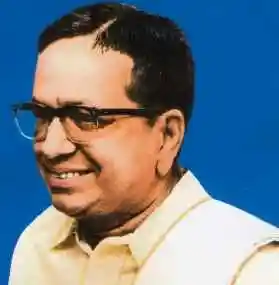Breathing new life into Carnatic music
India has a legacy of rich art and culture, most of which got lost with time, even by its own people. How much do you know about Indian classical music? Indian classical music has 2 sub-genres, one of which is Carnatic music. What is Carnatic Music and who was the person who revived it?

Madurai Mani Iyer. Image source: Discogs
Carnatic music is a system of music associated with Southern India which includes the modern Indian states of Karnataka, Andhra Pradesh, Telangana, Kerala, Tamil Nadu and even Sri Lanka. Indian classical music has 2 sub-genre, one of which is Carnatic music and another one is Hindustani music.
Carnatic music evolved from the Sanatana Dharma particularly the Samaveda popular in Southern India while Hindustani music emerged from the influence of Persian and Islamic culture in Northern India. Carnatic music is based on more vocal music. The compositions are written to be sung and even if they are played on instruments they are supposed to be performed in a singing style.
Do you know the Western heptatonic scale? It's C D E F G A B C (they are basically the Sa Re Ga Ma Pa of the Western Music). Do you know that the origin of these 7 western pitches is Carnatic music? It's believed that when Pythagoras visited India to learn Mathematics picked it up and introduced West to it. The Circle of fifth is also believed to be originated from Carnatic music.
Carnatic music might now be what it is if it weren't for Madurai Mani Iyer- the person who revolutionised it. Mani was born on October 28, 1912, to Madurai Ramaswamy Iyer and Subbulakshmi Amma in Madurai, Madras presidency of British India. You can see he was born in a musical household since his uncle, Vidwan Pushpavanam was a great classical musician. Unfortunately, his uncle died when Mani was very young.
Another tragic incident that happened in his childhood was that when he was playing archery with his friends. Accidentally, an arrow pierced Mani's right eye. His friends all scared helped him get the arrow out and tried to stop the blood. They told him not to mention this to his parents otherwise they won't let him come to play again. Mani went home and tried to hide the wound but his parents quickly found out something was wrong. They looked at the wound and immediately took him to the doctor. The eye specialist examined Mani's eye and concluded that it was too late to do anything as the eye had already suffered a lot of damage. Luckily, a small part of the eye was left unscathed. He made him a special set of glasses so he could see with what remained of his eye but also mentioned the vision might be a little blurry.
However, after this incident, Madurai Mani's days of calamities ended. He started flourishing as a pupil of Sri Rajam Bhagavathar who was a classical musician. He was his neighbour. In fact, they actually shared the same house. Mani and his family lived on the right side while Rajam and lived and taught his pupil on the left side of the house. Mani just used to walk to the other side of the house to receive his teachings.
When he was in secondary school Sri Harikesanallur Muthiah Bhagavathar, the great composer and authority of Carnatic music started a school called in his town, Madurai. Sri Rajam Bhagavathar was invited to be a music teacher in that school. Mani followed his teacher into the school as the first batch of students.
Mani used to practice for hours. He kept on reciting music. His father saw the keen interest Mani had for music and asked him if he would like to devote a 100% of his time to the world of music. Mani got enthusiastic about the idea and his father stopped his secondary-level studies of other subjects at the age of 12. Within 15 months, Mani became an expert in all nuances of music- Ragam, Thanam, Neraval and Swaram.
Mani's first performance was in a local Shiva temple. The next year he performed a concert which was witnessed by Shri Chandrasekharendra Saraswathy Swamigal while he was on his way to Rameshwaram. After witnessing Mani's performance, the saint blessed him and said the very words,"Music shall be your all, your worship, your prayer, your god."
Soon after that Mani began being regarded as a prodigy and became a leading musician. From the year 1927 Mani has sung at the Music Academy at all the annual conferences till 1967 without break! Madurai Mani used to cast a spell on his audience. People of all ages, even small children, and old people used to get spellbound once they heard him. People came in hordes when his concerts were organised.
Shop owners used to close down their shops and rickshawallahs left their rickshaws to listen to him. They sat on walls, on floors wherever they are a place to stand or sit. They said all the inconvenience melted away when Madura Mani (his nickname, Madura meaning sweet) started singing.
The way he sang was unique. People could feel that he loved music. When he sang he and the music became one. He eschewed the lyrics in a way that only he could do. Mani Iyer believed music should enliven the audience and that is exactly what his music did.
Mani Iyer won many awards like Ganakaladharar in 1944, Sangeetha Kalanidhi in 1959, President’s award in 1960, Isai Perarignar in 1962 and many more. He never married for he had completed devoted his life to music. Even though he left his studies midway he was an avid reader of English literature and had a keen interest in politics. Sadly the world lost its great maestro on June 8, 1968. He may have lived for a short time but he will live on forever through the people who treasure his music.


